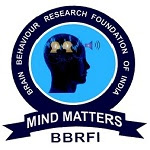One day while walking along the road, I suddenly felt short of breath, while gasping for air, my mind immediately connected the shortness of breath with one of the symptom suggesting to the possibility of having COVID-19. Feeling anxious about it, I spent few moments in reckless rumination of the possible catastrophic consequences that can follow from here. I imagined all the scenarios that can take place, from my own death due to COVID-19 to even the death of my loved ones. All this happened within a span of few minutes. Any one reading this might make fun of this, even I got worried about my own negative thoughts.
What happened above was not some abnormality of the mind or some neurological defect. It is just a marvelous machine working at its best, in this case, the brain. During the above episode, my mind was just reading the normal body reactions in an exaggerated way to the extent that I ended up doing self-diagnosis and also imagined all the worst outcomes. These negative thoughts are the outcome of millions of years of evolution. Brain is evolutionally hardwired to protect the body from any external threats at all cost. Here the emotions of fear and anxiety might create unpleasantness in us, but they are actually preparing the body for action in case of any eventuality i.e. fight or flight mode.
In my case, the brain was unable to detect any external threat and therefore, went to the most available information in the memory that can help establish sense behind shortness of breath. The most available information in my memory was related to COVID-19 pandemic and deaths from it, thanks to newspapers and social media, and from there brain made the association of shortness of breath with COVID-19. This association of external events with the most available information in the memory is called availability bias.
Had I known before that I will be mistaking a psychological irrationality with realism then I would not have wasted those few moments in worrying? The question is then how to differentiate between the two?
The answer to this is practice of mindfulness and patience towards our thought and emotions. Rather than just getting carried away with our emotions we look closely into them without judging them and then come to any conclusion. After all, any conclusion made with patience will lead to far better problem solving rather than in those made under the influence of fear and anxiety. The more we become capable in differentiating our psychological irrationality with realism, more we will be able to safeguard our sanity in these turbulent times.
Written by:
Divye Kartikey
Intern, Brain Behaviour Research Foundation of India
What happened above was not some abnormality of the mind or some neurological defect. It is just a marvelous machine working at its best, in this case, the brain. During the above episode, my mind was just reading the normal body reactions in an exaggerated way to the extent that I ended up doing self-diagnosis and also imagined all the worst outcomes. These negative thoughts are the outcome of millions of years of evolution. Brain is evolutionally hardwired to protect the body from any external threats at all cost. Here the emotions of fear and anxiety might create unpleasantness in us, but they are actually preparing the body for action in case of any eventuality i.e. fight or flight mode.
In my case, the brain was unable to detect any external threat and therefore, went to the most available information in the memory that can help establish sense behind shortness of breath. The most available information in my memory was related to COVID-19 pandemic and deaths from it, thanks to newspapers and social media, and from there brain made the association of shortness of breath with COVID-19. This association of external events with the most available information in the memory is called availability bias.
Had I known before that I will be mistaking a psychological irrationality with realism then I would not have wasted those few moments in worrying? The question is then how to differentiate between the two?
The answer to this is practice of mindfulness and patience towards our thought and emotions. Rather than just getting carried away with our emotions we look closely into them without judging them and then come to any conclusion. After all, any conclusion made with patience will lead to far better problem solving rather than in those made under the influence of fear and anxiety. The more we become capable in differentiating our psychological irrationality with realism, more we will be able to safeguard our sanity in these turbulent times.
Written by:
Divye Kartikey
Intern, Brain Behaviour Research Foundation of India

Very nicely articulated, how we react to any situation, do we get tense and panic or stay calm, all depends on this. Whats the term used for this state of mind? Is there anything like that?
ReplyDeleteWell written.... enlightening in context with present chaos due to pandemic. We are acting more on emotional quotient than the medical facts and common precautions.
ReplyDeleteWell written.... enlightening in context with present chaos due to pandemic. We are acting more on emotional quotient than the medical facts and common precautions.
ReplyDeleteWell written.... enlightening in context with present chaos due to pandemic. We are acting more on emotional quotient than the medical facts and common precautions.
ReplyDeleteVery Well written! One should develop this practice of mindfulness. We should never lose our patience even in adverse situation.
ReplyDeleteSo true and nicely articulated
ReplyDeleteVery well written
ReplyDelete👍👍
ReplyDeleteThis comment has been removed by the author.
ReplyDeleteWell
ReplyDeleteVery nice
ReplyDeleteA nice write up on how the impulsive system effects our interpretation of threat and tries to keep us safe. Great that you put in some tips on how to manage catastrophic thoughts. Perhaps take a look at Porges Polyvagal theory and Dual systems theory by Strack and Deutsch
ReplyDelete